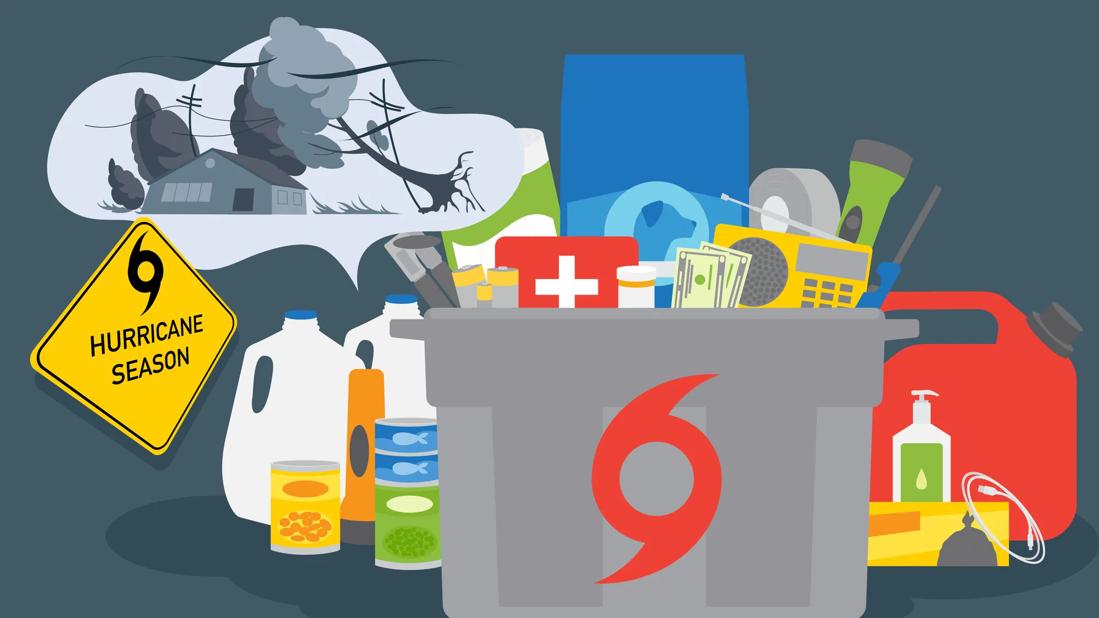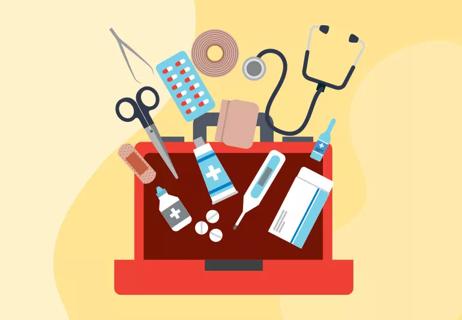Your storm prep checklist should include making an evacuation plan, rounding up supplies and refilling prescriptions

When you live in an area that’s prone to hurricanes, the possibility of the next big storm always looms. And when a hurricane does threaten to make landfall, you may find yourself scrambling to get ready — whether you’re new to the area, just in town for a visit or even a seasoned coastal dweller.
Advertisement
Cleveland Clinic is a non-profit academic medical center. Advertising on our site helps support our mission. We do not endorse non-Cleveland Clinic products or services. Policy
It’s a reality that emergency medicine specialist Aisha Subhani, DO, knows well. Dr. Subhani, who is based in southern Florida, shares critical tips for staying safe during hurricane season, including which medical supplies you should have on hand and how to best avoid injury when you’re prepping for and cleaning up from the storm.
Hurricanes can cause injuries or deaths related to a variety of health and safety risks, including but not limited to:
Assemble items you would need for a go-kit, as well as items you might need if you’re stuck at home after the storm.
“Consider your basic needs: What do you need to survive for a few days, when the supplies that you usually take for granted become scarce?” Dr. Subhani poses. “You can even buy kits that are solely focused on hurricane preparedness.”
If you’re making your own, consider:
Advertisement
It’s also a good idea to locate items that you might need to help clean up your home, yard and vehicle after the storm, like:
“Keep them in a central area so everything is easily accessible in case you need them,” she recommends.
If you live in an area where hurricanes are common, start planning before hurricane season arrives.
Dr. Subhani’s biggest overall tip? “Always be ahead of the game,” she advises. “That includes making sure that you have a list of your priority items and talking to your healthcare providers about what you should consider, especially if you or a family member have a chronic illness.”
Let’s delve deeper into what else those “priority items” might include, along with a hurricane preparedness checklist to help you round everything up.
What would trigger an evacuation? Where would you go if needed? Put together an evacuation plan that considers these questions and others, including how you’ll physically exit your home in case of emergency.
“If the lower level of your home is flooded, how will you get out safely?” Dr. Subhani asks you to consider.
In the U.S., the Federal Emergency Management Agency (FEMA) shares resources to help you make an evacuation plan, including how to identify escape routes and assess your personal risk during a flood.
Share your evacuation plan with everyone who lives in your household.
“The first things people usually worry about in a storm are food and water supplies,” Dr. Subhani notes. The American Red Cross suggests securing a two-week supply of food and water, including nonperishable, easy-to-prepare foods and one gallon of water per person per day.
If you have an infant who relies on baby formula, be sure you have enough of that, too, plus enough clean water to prepare their daily bottles. If possible, consider purchasing ready-to-feed bottles during this period.
In the aftermath of a storm, you may not be able to get to a pharmacy, so take care to refill any daily medications or emergency medications (like an inhaler or an epinephrine auto-injector) ahead of time.
“Make sure you have access to your medications and an adequate supply of them,” Dr. Subhani says. “I recommend at least two weeks, but some people say up to a month, depending on the medication.”
It’s always smart to have a full and robust first aid kit in your home, and that’s especially true before a natural disaster hits. Go through yours and replace anything that’s missing or expired.
Identify other must-pack medical items, too, especially if you or someone else in your home has a disability, chronic medical condition or other specific needs. In the event of an evacuation, you’ll want to bring portable equipment whenever possible (for example, a travel C-PAP or portable oxygen tanks), and don’t forget the appropriate charging cords, batteries and other device accessories.
Advertisement
“If you have a chronic condition, speak to your health service providers to learn what their emergency plan is,” Dr. Subhani says. “If, for example, you use an oxygen tank or are on dialysis, ask how you’ll get what you need in an emergency. Each company has its own disaster plan, so I recommend talking to providers at the start of hurricane season.”
Finally, if you have a loved one living in a nursing home or a hospice facility, Dr. Subhani recommends talking to facility staff ahead of time to learn how they plan to keep residents safe.
To be sure you’re covering all of your bases, consult FEMA and the Red Cross’s publication, “Preparing for Disaster for People with Disabilities and other Special Needs.”
You probably keep important phone numbers saved in your phone, right? But in the event of a natural disaster, it’s best not to have to rely on technology. Before the storm, create a hard copy list of important contact information for:
Advertisement
Laminate this list (or cover it in packing tape, in a pinch) and store it in a waterproof bag to keep it safe.
Dr. Subhani recommends storing important personal documents like Social Security cards, passports and birth certificates together in a single location, like a waterproof lockbox.
“That way, if you have to evacuate your home or leave in an emergency, those documents are all together in a place where they can be easily taken with you and not lost or ruined,” she notes.
It’s especially important to safeguard your medical records if you have an extensive medical history that includes, for example, chronic illness or surgery.
“If you have to go to another hospital or medical institution, you’ll have all that information on hand,” she adds.
Before the storm arrives, put fuel in the gas tank or charge your electric vehicle. If possible, park it at a high enough level that it won’t be affected by floodwaters.
Dr. Subhani points out that people who live in condominiums are often physically safe in their homes, but their cars flood in lower-level garages.
“Talk to your condo association to ask what measures they can ahead of time, like keeping the bottom floor of the garage empty,” she recommends.
Advertisement
In the U.S., various public safety offices, including the National Weather Service, are authorized to send targeted emergency alerts to mobile devices. Most modern cell phones are automatically enabled to receive these Wireless Emergency Alerts (WEAs), which beep and buzz loudly when they’re delivered.
“Each county also has its own method for sharing emergency updates and other important information,” Dr. Subhani shares. “Sign up for these alerts so you can stay abreast of local emergency protocols.”
As an emergency physician, Dr. Subhani is all too familiar with the types of injuries that can occur when people are trying to get their homes storm-ready.
Water and electricity don’t mix. “We see electrical injuries from time to time from outlet and appliance use during storms,” Dr. Subhani says. If you’re in an area that’s at high risk for flooding, follow all recommended safety protocols for unplugging your electronics and turning off breakers.
New to the area? Never been through a storm before? Just not sure about something? Dr. Subhani urges you not to guess or assume.
“If you don’t know, ask someone in a position of authority rather than trying to figure it out on your own,” she advises. “Avoid mishaps, mistakes and unintended consequences by trying to reach someone who can give you a proper answer.”
It can be tempting to shelter in place and try to ride out the storm, especially if you’ve lived through incoming storms in the past. But Dr. Subhani stresses that evacuation mandates should be seen as exactly that: mandates.
“Follow all guidelines and instructions that you’re given from the authorities,” she states. “Please don’t ignore them. If you’re in a mandatory evacuation zone, take heed and leave. Nothing you own is worth more than your life.”
Whenever possible, avoid floodwaters. Wait for disaster response teams to drain the area and give you the clearance to get out safely.
“Floodwater is not clean water; it’s not hygienic,” Dr. Subhani explains. “Sitting water carries diseases, and without visibility, you have no idea what’s in there, in terms of debris, chemicals and even living creatures.”
Proper safety measures are critical after the hurricane hits, too:
Hurricanes can impact more than just your physical safety: They can also affect your mental and emotional well-being. It’s normal to experience feelings like fear, anxiety, stress and even post-traumatic stress disorder after going through a natural disaster.
If you live in the U.S., the Department of Health and Human Services operates the Disaster Distress Helpline, which offers around-the-clock, confidential counseling and support. Call 1.800.985.5990 for help.
Even if you’ve ridden out bad weather in the past, remember — each storm is different, and they can intensify quickly.
“Planning ahead, prioritizing and following instructions from local authorities is so important,” Dr. Subhani says. “Possessions can always be replaced, but you and your loved ones can’t be. Stay vigilant and don’t let your guard down.”
Learn more about our editorial process.
Advertisement

20 minutes is the max — and you may actually need a lot less

Keep healthy foods on hand, like tuna packets, canned veggies and fruits, and beans and rice

Keep these items on hand for minor scrapes, burn, sprains and more

There’s no way to stop a heart attack on your own — call for help immediately

The emergency room is for serious medical issues; urgent care can help when you can’t get a quick appointment with your child’s doctor

Around age 4, start talking to your child about what an emergency is and how to call emergency services

First, assess the seriousness of the wound, and then apply light pressure to stop any bleeding

Ice and ice-cold water can damage tissue, restrict blood flow and delay the healing process

Wearing a scarf, adjusting your outdoor activities and following your asthma treatment plan can help limit breathing problems

Your diet in the weeks, days and hours ahead of your race can power you to the finish line

When someone guilt trips you, they’re using emotionally manipulative behavior to try to get you to act a certain way